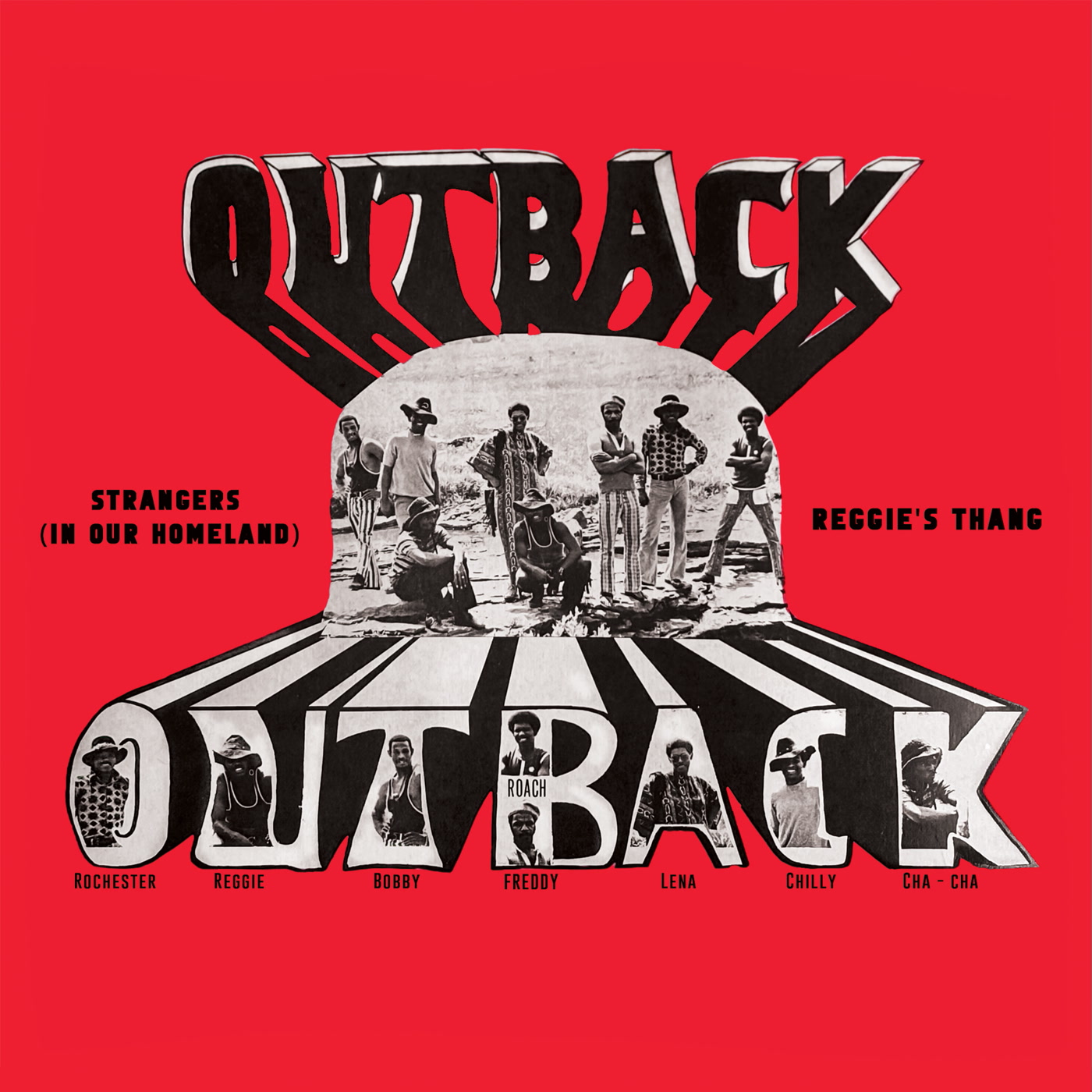
An exclusive 7″ re-release of this psychedelic funk ballad from Tulsa’s “Outback” Band. As featured on Now-Again’s ‘More Loving On The Flipside’ compilation, “Strangers (In Our Homeland)” epitomises the expression of social & political change during an era of psychedlia infused music. In partnership with the two surviving members of Outback, both Symphonical & Now-Again are proud to showcase the voice of independent artists.
———-
The origin of “Outback” dates back to the late 50s, a five-piece blues outfit named “Little Lo and the Rest of Us” included music educator & bass guitarist Edward “Cha-Cha” Cherry, saxophonists Eugene “Buggy” Roach & James “Flab” Farley whom, alongside drummer Roscoe J. Dabney III “Roach”, Ronnie Wilson on trumpet, guitarists Roy “Rochester” Walker & Michael Collins, would form The Magnificent Seven, the house band for Tulsa’s ‘Rose Room’.
Alumni of Booker T. Washington High School, The Magnificent Seven influenced & set the standard for the Tulsa sound, as demonstrated through their only single, recorded in 1966, the two part ‘Pluck-A-Pluck’. ‘The Sevenettes’, the groups’ female vocal trio, included the rotation of Lena Luckey Wilson, Gwendolyn French, Rose Brewer Lewis, Jeanetta Williams & Maxayn. The Magnificent Seven, led by “Cha-Cha”, toured nationally throughout the 60s with their infectious, raw R&B sound, and were the platform for many of Tulsa’s talent including Ronnie & Charlie Wilson who would later create the GAP Band.
Roscoe J. Dabney III, the first Black Panther to establish the Tulsa chapter in 1969 known as the NCCF (National Committee to Combat Fascism), proposed the name change to “Outback” in the early 70s. Their sound & formation was changing from R&B to Psychedelic, from the grit to the phase, epitomised by their unique line-up of having two bassists playing simultaneously, both Reggie Cherry & “Chilly” Willie Lewis, the musical foundation to their only recorded single, “Strangers (In Our Homeland)” & “Reggie’s Thang”.
Song writer & band affiliate, Maurice Pope, produced the lyrics to “Strangers (In Our Homeland)” and handed over the musical attributes to Willie Lewis & Outback to convey his message, as sung by Lena Luckey Wilson. Dabney recalls the song is based on religious scriptures, whilst highlighting the parallel of Black slavery in the U.S.
“Reggie’s Thang”, written by Dabney’s cousin, bassist Reggie Cherry, provides a psychedelic instrumental, a sound which Lena recalls is what set apart Outback from other Tulsa groups. As well as playing clubs, the seated shows provided an environment for the group to showcase their musicianship to those who wanted to be immersed & listen.
Their single, released on Empathy, was recorded in 1972, and are the only known recordings by Outback. Recorded live onto 8-track at a studio located at on East Pine St in the heart of Tulsa’s Black community, an independent & unknown studio located on a strip mall.
The Outback members who recorded are:
Lena Luckey Wilson – Vocals
Roscoe J. Dabney III “Roach” – Drums
“Chilly” Willie Lewis – Bass
Reggie Cherry – Bass
Edward “Cha-Cha” Cherry – Keys
Joyce Daws – Trumpet
Roy Walker “Rochester” – Guitar
Robert Luckey “Uncle Bobby”- Percussion
Fredy Berry “Freddy” – Tenor Sax
Band leader & group manager: Edward “Cha-Cha” Cherry
Booking Agent: Ernie Fields Sr.
In 1973 whilst performing in Ft. Worth, TX, Buck Ram approached Willie Lewis backstage and invited him to join The Platters, Lewis accepted. Supposedly, a recording deal was offered to Outback in exchange, which never happened.
The group continued in various formations after Lewis left, however as an integral member, the feeling never equalled their original form and soon after dissolved.
Leon Russell approached Lena Lucky Wilson in 1974 to go on tour with the GAP Band as their backing singer, upon returning Tulsa Lena moved to Los Angeles to pursue her musical career with Leon & Mary Russell amongst various others.
Dabney continued music and became a TV producer & director in 1976.
The only surviving members of Outback today are Lena Luckey Wilson & Roscoe J. Dabney III.

